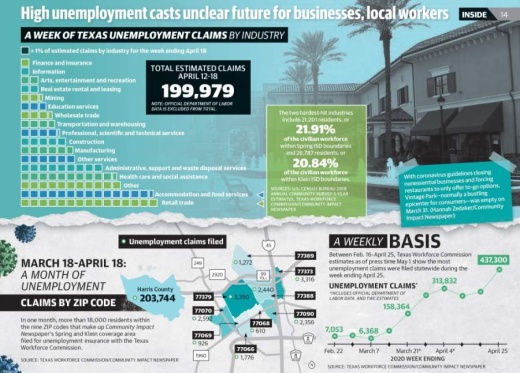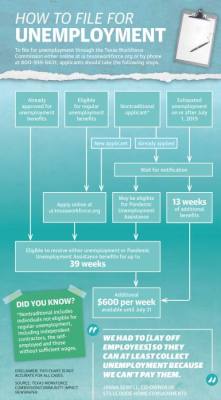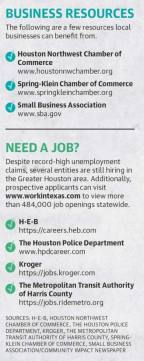As a result, severe job losses have been felt across the state as seen by record-high payouts in unemployment benefits from the Texas Workforce Commission.
“[The week of April 17], we saw the largest amount of benefits being paid ... April 13 at $183 million in benefits paid out to 137,000 claimants,” said Cisco Gamez, TWC media and public relations specialist, in a Facebook Live event April 15. “On April 6, we [paid out] $41 million to 64,000 claimants.”
In addition to record unemployment claims, the effect of the coronavirus outbreak has also been felt among small businesses in Spring and Klein.
Janna Sewell, co-owner of StillGoode Home Consignments on Louetta Road, said her business had to cut its services and let go of employees.
“We had to [lay off employees] so they can at least collect unemployment because we can’t pay them,” Sewell said. “We don’t have any money coming in. We’re a consignment store, so it’s a little bit different. We’re selling things for other people, so we’re having to pay our consignors as well.”
Additionally, despite access to financial assistance at the federal, state and county level, many business owners have faced challenges finding lenders and receiving funds, leaving their futures uncertain.
Swelling unemployment
In late March, Harris County officials mandated nonessential businesses close their doors through April 30 to curb the spread of COVID-19. As the state saw unemployment numbers soar beginning in mid-March as a result, local economic leaders now say the future of the job market remains unclear despite Gov. Abbott’s April 27 announcement to begin reopening some businesses, effective May 1.
Across the state, TWC had processed more than 1.5 million unemployment claims from March 14-April 15—a normal year and a half’s worth of claims in just one month’s time, Gamez said.
In Harris County alone, the number of claims filed the week of April 18 saw a spike from 2,337 claims that same week in 2019 to 40,712 in 2020. In Spring and Klein, more than 18,000 residents filed for unemployment insurance between March 18-April 18, according to TWC data.
According to TWC, the state’s retail industry was hardest hit, with more than 29,000 unemployment claims filed in the week ending April 18, followed by the accommodation and food services sector with 28,860.
Within Spring ISD boundaries, 21,201 residents, or 21.91%, of the civilian workforce, are in the two industries, according to 2018 Annual Community Survey five-year estimates from the U.S. Census Bureau. Meanwhile, 26,787 residents, or 20.84%, of the population within Klein ISD’s boundaries work in those sectors.
Patrick Jankowski, senior vice president of research at the Greater Houston Partnership, said during an April 28 webinar that he estimated more than 400,000 unemployment insurance claims in the Greater Houston area had been filed for March and April.
Bobby Lieb, president and CEO of the Houston Northwest Chamber of Commerce, said it will take time for the local economy to get back to where it was pre-pandemic.
“Labor is always the last thing to be brought back, [as it is the] most expensive cost,” he said.
Depleting funds
In response to the pandemic, the Small Business Administration has given business owners the opportunity to apply for financial assistance programs such as the Paycheck Protection Program, a fee-less loan designed to cover payroll for 2 1/2 months.
As part of the Trump administration’s Coronavirus Aid, Relief, and Economic Security Act’s $2 trillion economic relief package, the PPP allocated almost $349 billion to eligible small business applicants with another $320 billion allocated for applicants starting April 27.
Mary Ann Landry, the executive director of Consultants in Dental Aesthetics, said her business, located on Cypresswood Drive in Spring, was quick to apply for the PPP and Economic Injury Disaster Loan—an emergency advance to cover operating expenses—shortly after the programs were announced in late March.
Landry said she had to lay off almost 80% of her staff due to restrictions on nonessential services but has since been able to rehire several administrative employees to work remotely.
“We did receive word this week that we were approved [for the loans], and so that is a great relief,” Landry said in an April 16 interview.
However, many applicants are having trouble finding participating lenders and receiving PPP funds, said Joe Harper, executive director of the Small Business Development Centers at Texas State University.
“The challenge is we’re running out of money,” Harper said in an April 15 webinar.
Similarly, Harris County paused a $10 million forgivable loan program just four days after it was launched April 9 due to overwhelming interest.
Sewell said she applied for the PPP and EIDL programs through Chase Bank but was disqualified based on inaccurate claims that her business had employees outside of the country. She said her consignment business has since reapplied with another bank and will continue to operate out of a depleting emergency fund to cover rent, utilities and insurance costs. While she expects to rehire 100% of her staff as soon as possible, Sewell said she foresees challenges.
“If ... people are uncomfortable getting out, it doesn’t really do me much good to have my employees if there’s no one coming out to shop,” she said.
Gradual steps to reopen
In late March, the Houston Northwest Chamber of Commerce launched an online survey to gauge how chamber members were faring during the county’s stay-at-home order through April 30.
According to the results released in early April, 92.6% of 95 respondents said their business is being negatively affected by the coronavirus. Additionally, 25.5% of 98 respondents said their business was currently closed.
On April 17, Abbott announced a plan to gradually reopen the state by allowing retail businesses to offer to-go services beginning April 24. On April 27, Abbott announced an order allowing retailers, restaurants, movie theaters and malls to reopen with 25% occupancy May 1.
Dylan Sherman and Hannah Zedaker contributed to this report.







